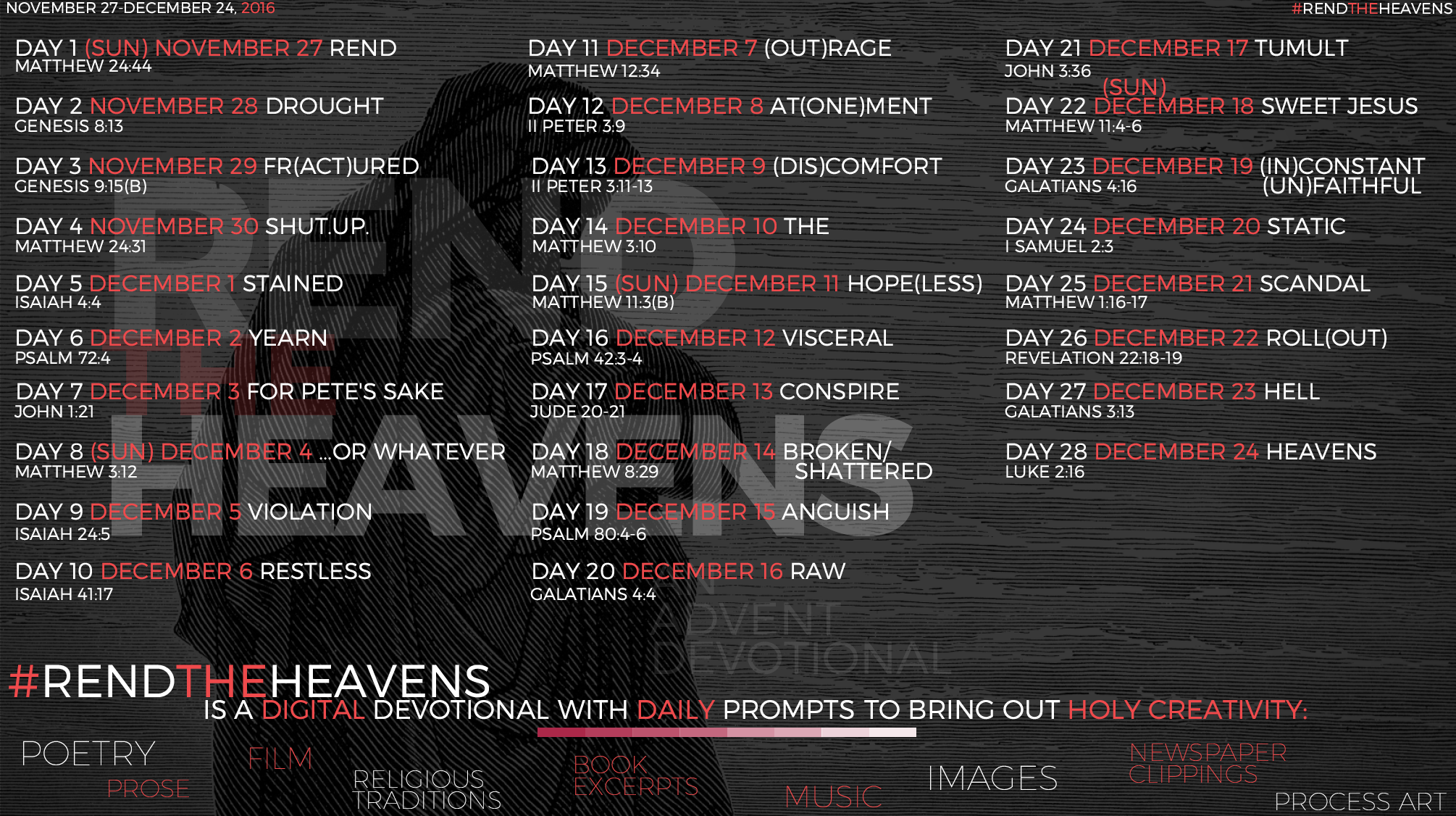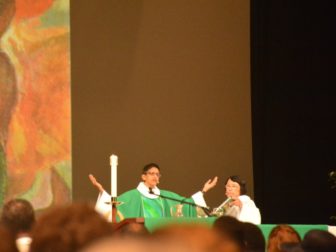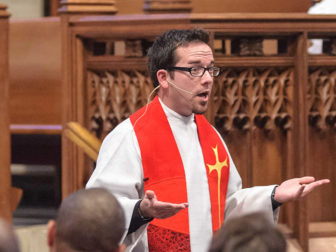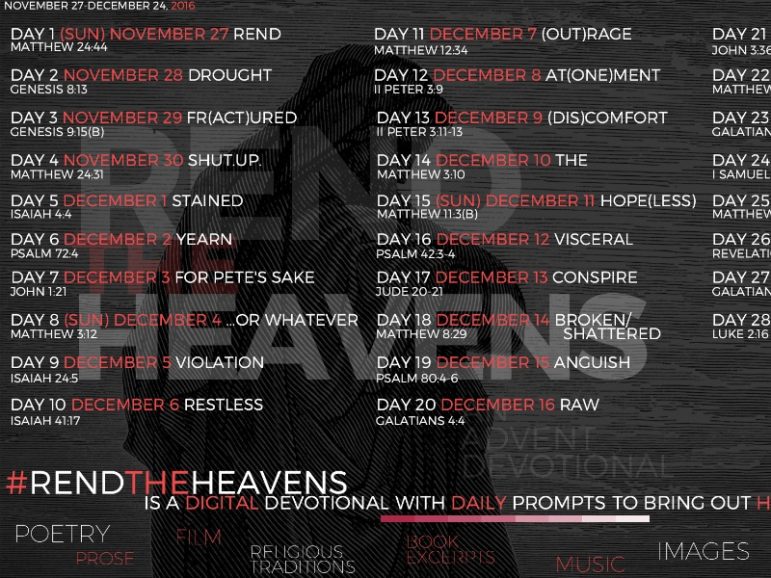
Rend the Heavens is the PG-rated version of F*** This S***: An Advent Devotional. Photo courtesy of the Rev. Tuhina Verma Rasche and the Rev. Jason Chesnut
(RNS) For many Christians who observe the liturgical season of Advent leading up to Christmas, an Advent devotional is a beloved companion.
Such devotionals typically include a short Scripture reading and reflection on the birth of Jesus.
But most are “crap,” according to the Rev. Jason Chesnut of Baltimore.
“They’re all about hope and love and joy and candles. … It’s always this nice, warm, feel-good thing, and I don’t think that gets to the crux of what the season is about,” said Chesnut.
[ad number=”1″]
At least, he said, it didn’t get to the crux of this year’s dark news: demonstrations against the Dakota Access Pipeline near the Standing Rock Sioux Reservation in North Dakota; the Flint water crisis; the shootings by police of Philando Castile, Alton Sterling and others; the spike in hate crimes since the election of President-elect Donald Trump.
So Chesnut and the Rev. Tuhina Verma Rasche, both pastors in the Evangelical Lutheran Church in America, created their own digital Advent devotional for 2016, unorthodoxly titled “F*** This S***.”

The Rev. Tuhina Verma Rasche, a pastor within the Evangelical Lutheran Church in America, co-created a digital Advent devotional for 2016 with the unorthodox title of “F— This S—.” Photo courtesy of the Rev. Tuhina Verma Rasche
“We are not using this to be ‘cool,’” Verma Rasche, who’s based in the San Francisco Bay Area, wrote in a post announcing the devotional on the internet platform Medium.
“We are using these words because they are troubling. They are unsettling. They are being used to move us from places of complacency. If anything, we are using these words to reflect the brokenness of the humanity in which we live.”
The idea for the devotional came as Chesnut and Verma Rasche were preparing for the grass-roots “Decolonize Lutheranism 2016″ gathering this fall in Chicago.
After back-to-back police shootings of black men, Verma Rasche messaged her fellow pastor the poem “Rend the Heavens,” a Psalm for Advent that blogger Micah J. Murray had written in 2014. It repeats the line, “F*** this s***.”
Chesnut messaged her back with the idea for the Advent devotional.
[ad number=”2″]
Verma Rasche then created a Facebook post asking people for their favorite swear words. It got nearly 100 responses — far more than her posts usually get, she said.
That may be why a new study finds people’s preference for positive words declines during times of war and economic hardship. The study, which analyzed Google Books and The New York Times’ archives from the last 200 years, also found an overall decrease in positive language use over that time period.
The two pastors then matched the list of expletives she had collected with the Scripture readings from the Daily Revised Common Lectionary for the season of Advent — verses, she said, “that really kind of ask, ‘Where are you, God?’ and also verses that were a cry for justice and a cry for righting the wrongs of the world.”
“I think a lot of that is missed in the season of Advent.”
[ad number=”3″]
Advent traditionally has been considered “a little Lent,” the season of repentance leading up to Easter, when Christians celebrate the resurrection of Christ.
It begins with the prophet Isaiah’s call for God to “tear open the heavens and come down,” Chesnut noted, and that theme continues in prayers throughout the season, not just awaiting the birth of Jesus, but also Christ coming again at the end of time.
The two pastors created a PDF (also available in a PG-rated version titled “Rend the Heavens”) listing the themes and verses for each day of Advent and released it to the internet, inviting others to post their reactions to the prompts using the hashtag #F***ThisS*** (using the actual letters).
They also are posting written reflections by themselves and others and artistic responses by artist and activist A’Driane Nieves on Medium.
In the days since the first Sunday of Advent (Nov. 27), Chesnut said they have received “phenomenal” reactions: haikus, photographs, other writing and images. They’ve heard from both Christians and non-Christians who have said they’ve never observed Advent or they don’t go to church or they haven’t been interested in devotionals in years – until now.
As someone struggling with her faith in the midst of everything that is 2016, I am very here for this advent devotional. https://t.co/hzEgKZ36Q4
— Lisa Lindle (@fullnby) November 30, 2016
And while Chesnut said the response “overwhelmingly” has been positive, they also have received pushback from other Christians about the R-rated language.
“The cry for justice and mercy doesn’t need to be crude. We don’t have to scream and rail – God’s in control,” one Twitter user responded to his tweets about the devotional.
Another Facebook commenter wrote, “I guess we can state reasons to justify foul language but does it really belong in the church?”

The Rev. Jason Chesnut, a pastor within the Evangelical Lutheran Church in America, co-created a digital Advent devotional for 2016 with the unorthodox title of “F— This S—.” Photo courtesy of the Rev. Jason Chesnut
But, Chesnut said, “Jesus coming into the world isn’t about Advent calendars or counting down the days until Christmas. It’s really a sense of saying, ‘OK, the world is messed up,’ and we are tapping into the prophetic heritage of saying that we are crying out for God to do something about it.”
Their language isn’t all that different from the harsh words of the prophets or the book of Revelation – or of the salty reformer who led to the founding of their denomination, he said.
“I think Luther would be very proud of us,” Chesnut said.
Verma Rasche added, “Are you kidding? I think (the prophet) Amos would be really proud of us. Isaiah would be very proud of us – and Ezekiel.”





